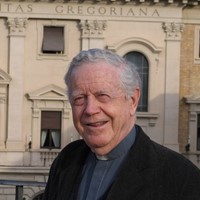Please God, no sudden heart attack will take Pope Francis away from us. But if that did happen, how would I sum up the legacy of his three years as head of the Catholic Church (March 2013−March 2016)?
Eight themes shape my summary. Almost all of them appear in The Joy of the Gospel, an apostolic exhortation issued by Francis in late 2013. One of the most remarkable spiritual documents of modern times, it reveals so much of what he cherishes and has set himself to do.
First, Francis is obviously driven by what he calls “a passion for Christ and his people” (The Joy of the Gospel, 268). The love of Jesus and desire to follow Jesus is the golden thread that runs through The Joy of the Gospel and his entire ministry. As he told a group of educators in September 2013, “…stay with Jesus. Learn from Jesus. Allow Jesus to warm your hearts.”
Second, Pope Francis takes seriously what the Second Vatican Council said about the Church being “both holy and always in need of purification” (The Dogmatic Constitution on the Church, 8). Christ “calls the Church to that constant reformation which she invariably needs” (Decree on Ecumenism, 8).
In a long interview he gave in August 2013, Francis began by identifying himself as a sinner. In The Joy of the Gospel he writes, “I must think about the conversion of the papacy.” He adds, “the central structures of the universal Church also need to hear the call to pastoral conversion” (32). At a pre-Christmas 2014 meeting with the members of the Roman Curia, he castigated the sins of the Church’s central administration and specified fifteen ailments that can plague its members. In his final speech at the recent international synod in Rome, he admonished “the closed hearts” of those bishops “who frequently hide behind the Church’s teaching and good intentions” (24 October 2015).
Third, Francis has set his face against an “excessive centralisation”. He insists that bishops around the world are responsible with him for teaching and leading the Church. The Joy of the Gospel repeatedly quotes what conferences of bishops in the five continents have taught. Less than a month after his election, Francis showed his desire to make the governance of the Church truly global. He appointed eight cardinal archbishops (now nine, the G9) drawn from every continent to advise him in his decision-making and reform of the Roman Curia.
Francis has begun creating more cardinals from Latin America, Africa, Asia, and Oceania, where well over 50% of Catholics live. In 2013, Europe and North America provided over 60% of the cardinals eligible to vote at a papal election. The college of voting cardinals has not represented fairly the Catholic world.
Fourth, Francis constantly protests against the immense economic inequalities that disfigure human society and leave millions hungry and without proper housing and medical services. He denounces “the globalisation of indifference” (The Joy of the Gospel, 53-54). He also proposes learning from the poor, who have “much to teach us” (The Joy of the Gospel, 198). In Laudato Si’, his 2015 encyclical on ecology and climate, the Pope has called all human beings to practise justice towards our fragile planet and care for it as our common home.
Fifth, Francis has set himself to promote the wellbeing of marriage and family life. He does so in a realistic way. On 14 September 2014, he celebrated a wedding in St Peter’s Basilica for twenty couples. Many of them had already been living together, and the daughter of one couple was in attendance, and so too was the eight-year-old son by a previous relationship that one bride brought along. All twenty couples were surprised with joy at the Pope’s loving concern for them.
Sixth, the Second Vatican Council initiated “dialogue” with other Christians, but called them “separated brethren”. For Francis they are “fellow pilgrims”, from whom we may have much to learn (The Joy of the Gospel, 244-46).
Seventh, the Second Vatican Council broke new ground with Jews and encouraged fresh relations with them. Francis insists that “as Christians, we cannot consider Judaism a foreign religion. Dialogue and friendship with the children of Israel are part of the life of Jesus’ disciples” (The Joy of the Gospel, 247-48).
Eighth and finally, where the Second Vatican Council stressed truth and goodness, Francis has added what he calls “the way of beauty”. He writes of “the goodness and beauty” that “shine forth in a life of fidelity to the Gospel” (The Joy of the Gospel, 167-68).
Shortly after he was elected head of the Catholic Church, Francis continued the papal tradition of washing feet on Holy Thursday. He did so in an unprecedented way. He visited a prison for young offenders and washed the feet of twelve inmates, including two women: a Serbian Muslim and an Italian Catholic.
In July 2013, he made his first official journey outside Rome by visiting the island of Lampedusa. Shortly before he arrived, a boat carrying 165 asylum seekers from Eritrea pulled into the harbour of that tiny island. Francis celebrated the Eucharist in a sports field which serves as a reception centre for thousands of desperate people fleeing across the Mediterranean. After Mass he laid a wreath in the harbour to remember all the adults and children who have drowned trying to reach Lampedusa.
Pope Francis is at his eloquent best on “the way of beauty”. He could have been talking of himself when he wrote of the “beauty that shines forth in a life of fidelity to the Gospel”. He has shown the world the face of a beautiful disciple of Jesus Christ.























































































